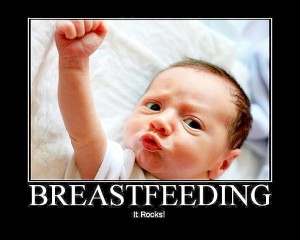 Many new mothers wonder how long they should breastfeed their baby. While the American Academy of Pediatrics recommends nursing for at least the first year of life, this may not be a realistic goal for all mothers. It is important to know that even if you only nurse your baby for a few weeks or even a few days, you will both receive many important benefits from the nursing relationship. Remember that you can always quit nursing at any time, but only if you give it a chance and see how things go.
Many new mothers wonder how long they should breastfeed their baby. While the American Academy of Pediatrics recommends nursing for at least the first year of life, this may not be a realistic goal for all mothers. It is important to know that even if you only nurse your baby for a few weeks or even a few days, you will both receive many important benefits from the nursing relationship. Remember that you can always quit nursing at any time, but only if you give it a chance and see how things go.
Here is some information which may help you decide how long to nurse your baby:
If you nurse your baby for a few days after birth:
- You provide him with a healthy dose of colostrum, often called the baby’s ‘first vaccine’.
- Colostrum is the sticky yellowish fluid that your breasts produce right after birth, before your milk ‘comes in’. Your body starts colostrum production during the last few months of your pregnancy as it prepares your breasts for lactation. Some moms are able to express drops of colostrum before they give birth, and small amounts may even leak out enough for moms to notice it on their clothes.
- Colostrum is highly concentrated, and is easy for the newborn’s immature system to digest. Its main function is to protect the newborn from infection by coating the baby’s intestinal tract and acting as a barrier to prevent the invasion of harmful bacteria. It protects your baby from illnesses that you have been exposed to, as well as illnesses that he may be exposed to. It also provides important nutrients, which is especially important for babies who are sick or premature.
- Colostrum functions as a laxative, helping clean out meconium (the dark greenish/black tarry stool that the baby’s intestines form before birth), helping reduce the incidence of jaundice in the newborn baby.
- Sometime between the second and fifth day after your baby is born, your milk will change from colostrum to transitional milk, which is thinner and more plentiful. This milk also contains important antibodies, which will continue to protect your baby for as long as he nurses.
- After about the tenth to fourteenth day, the colostrum is gone, but the mature milk will continue to produce antibodies, just not as concentrated as the colostrum.
- The protein in breast milk is much easier to digest than the protein in cow’s milk or formula, making your baby less likely to suffer from digestive problems such as gassiness, rashes, and colic.
- Breastfeeding during these early days is helpful for you as well as your baby. Breastfeeding helps you develop a special closeness as you get to know this new little person who has entered your life, and also helps your body recover from childbirth more quickly by releasing hormones that contract your uterus and reduce postpartum bleeding.
- The benefits of breastfeeding in the early days provide an excellent reason to nurse your baby as early and as frequently as possible after birth, even if you feel that you can only do it for a short period of time.
If you nurse your baby for 4-6 weeks:
- You will be helping to ease his transition through the most vulnerable part of his infancy.
- Babies who are breastfed have lower rates of many illnesses, including digestive and respiratory problems, pneumonia and meningitis, and SIDS. For more information about the protective benefits, see Why Breastfeed?
- Breastfeeding during the early weeks helps you recover from childbirth faster. Nursing ‘forces’ you to stay off your feet and sit still for long periods of time, since babies nurse so often during the first weeks of nursing while they are establishing your milk supply and growing so quickly. When you are bottle-feeding, it’s easy to let someone else feed the baby while you run around cleaning house or shopping. I think nursing is nature’s way of helping you get the rest you need while you are recovering from childbirth. Think about it: mothers used to stay in bed or in the hospital for at least a week or two after giving birth, and now they are up and running after a 24 hour hospital stay.
- The hormones prolactin and oxytocin that are released when you nurse are called “the mothering hormones”, and they help you relax. When researchers give them to laboratory mice, (even males), they start building nests and doing motherly things. They really are powerful hormones, and many mothers report that even when they are extremely stressed, they feel a rush of relaxation when their milk lets down.
If you nurse for 3-6 months:
- Your baby will be healthier overall than the baby who is formula fed.
- Studies have found that babies who were exclusively breastfed for at least four months had half as many ear infections as formula fed babies.
- Nursing can help you lose the extra weight you put on during pregnancy. Mothers who breastfed lose more weight by the time their babies are 3-6 months old than formula feeding mothers who consumed fewer calories, because breast milk production mobilizes the fat you stored during pregnancy, and also uses up about 500 calories each day. See Nutrition, Weight Loss, Exercise and Breastfeeding for more information.
- By the time you have been nursing for a few months, you have overcome any early obstacles such as engorgement, sore nipples, and marathon cluster feedings. Nursing is so much easier than bottle-feeding at this stage: no bottles to wash or carry, no constipation, and poops and spit up that smell so much better than formula-fed babies. Also, your baby isn’t nursing as often as a newborn, and you can give him occasional bottles if you choose to, which helps free you up from total responsibility for all feedings.
If you nurse for 6 months:
- Your baby will be much less likely to have problems with allergies, since at around that time, your baby’s intestinal tract begins to produce antibodies which coat his intestines and protect him from foreign proteins and allergens.
- Mother’s milk will supply all the nutrients your baby needs for at least the first six months of life, and if you have a family history of allergies, it’s a good idea to wait until at least six months before introducing solid foods, as allergies are less likely to develop after this time.
- Most mothers who exclusively breastfeed for six months will not have a period during that time, and rarely ovulate. If you are nursing with no supplements or solids, you have about a 98%-99% rate of protection against pregnancy. This only applies if you are totally breastfeeding: no water, formula, pacifiers or scheduling feedings. Since the majority of mothers will not practice this type of exclusive breastfeeding, most will use an additional method of birth control during this time.
- Many of the studies of the protective effects of breastfeeding use the six month mark as a cutoff. That means that researchers have found that nursing for at least six months has been shown to have protective effects against many illnesses, including childhood cancers.
If you nurse for 9 months:
- You will be helping your baby through one of the most important developmental periods of his young life. Babies between six and nine months go through so many changes – sitting up, teething, crawling, pulling up, starting solids, and more. Even though an older baby is eating solid foods, breast milk is still the most important part of his diet, and continues to provide him with important immunities at a time when he is crawling around and putting EVERYTHING in his mouth, including yucky, germy stuff.
- Lots of research points to the beneficial effects of breast milk on a baby’s intellectual development. Breastfed babies score an average of 8 points higher on IQ tests than formula-fed babies, and this seems to hold true even when things like parent’s educational and socioeconomic backgrounds are factored in.
If you nurse for a year or more, as recommended by the American Academy of Pediatrics:
- Your baby will receive health benefits that last a lifetime. Long-term nursing protects against ulcerative colitis, diabetes, asthma, Crohn’s disease, obesity, and high cholesterol in adulthood. Babies who are breastfed for a year or more are less likely to need speech therapy or have dental problems like braces later in life.
- Think about the cost savings if you nurse for a year! Formula can cost as much as $200.00 a month, depending on the type you use. The cost of bottles, nipples, and extra doctor’s visits also add up. You can easily save at least $1,000 during the first year by nursing your baby.
- You will continue to provide him with the best form of nutrition. The fact that most babies can tolerate cow’s milk after one year doesn’t mean that they don’t continue to get benefits from breast milk. The concentration of antibodies in human milk becomes more concentrated as the volume they consume goes down.
- During the toddler stage, your baby will encounter many spills and bumps and bruises as he navigates his new world. Nursing provides a perfect way to comfort a toddler who has bumped his knee, or who is fighting sleep after a busy day.
- Children who are breastfed long term tend to be more secure and independent than babies who are weaned early, because they have had their needs met during the vulnerable period of infancy. Don’t worry that your baby will nurse forever – all babies wean eventually, no matter what you do. Children grow up way too quickly, and the time they spend nursing is so short in comparison to the eighteen years that they spend at home.
- Long-term nursing provides benefits for moms, too. Many of the benefits of breastfeeding are dose-related. This means that the longer you breastfeed over the course of your lifetime, the lower your risk of breast cancer and osteoporosis.
Whether you nurse your baby for days, weeks, months, or years, you will both benefit. Some mothers are hesitant to begin breastfeeding if they know they won’t nurse for long, or are uncertain about whether it will hurt, or tie them down, or whether they will be able to produce enough milk. It’s always worth giving breastfeeding a try. Even if it doesn’t work out, you can always stop nursing at any point. Many mothers start out with the intention of only nursing for a short time, and then find that they keep going much longer than they ever thought they would. Take it one day at a time, and remember than even one feeding of breast milk provides important benefits to both you and your baby.
Anne Smith, IBCLC
Breastfeeding Basics
(Edited September, 2013)
* Please ‘Pay it Forward’*
If you found this article helpful, please consider making a small donation to my favorite cause – Project Pets: Spay, Neuter, Love – an all volunteer, non-profit organization that provides free spay and neuter services for homeless rescue dogs and cats…because every baby deserves a home, whether they have two legs or four! Visit Project Pets on Facebook to find out how you can help create a happy ending for a furbaby.
 Breastfeeding Basics
Breastfeeding Basics





